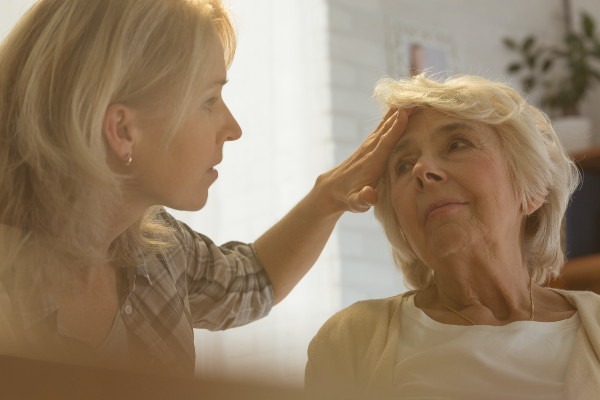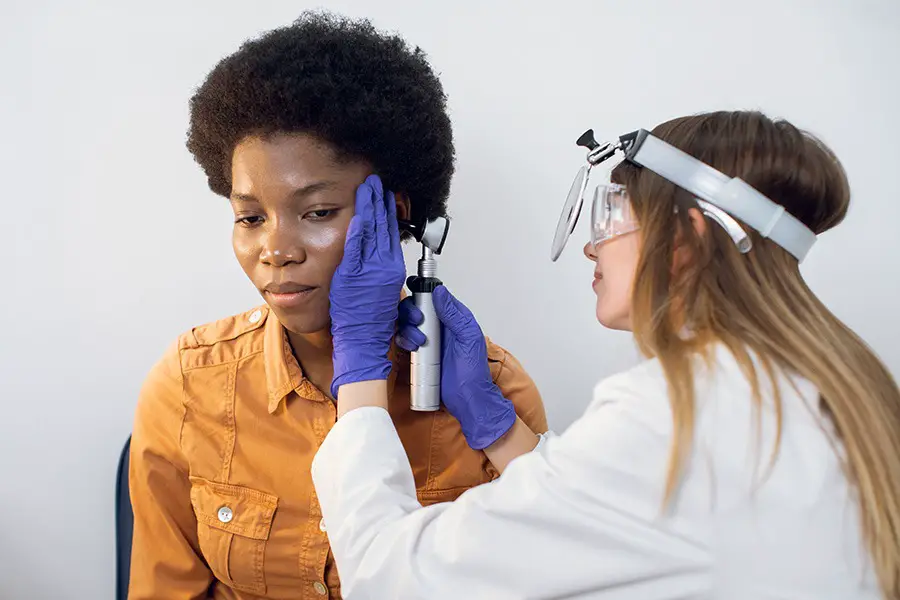Introduction
We live in a noisy world, where we are constantly exposed to sounds that can harm our hearing. Some of us can escape this noise pollution, but what about those who face a different kind of silence? A silence that is not peaceful, but lonely and frightening. This silence is often the reality of people with sensorineural hearing loss. Despite the advances in medical science, sensorineural hearing loss remains a major challenge, especially for the elderly population.
This condition, caused by damage to the hair cells in the cochlea or to the nerve pathways from the inner ear to the brain, is the most common type of permanent hearing loss. As we explore this topic, we aim to highlight various aspects of this issue. Let’s learn about the severity of sensorineural hearing loss in the elderly, its profound impact on specific communities such as veterans and musicians, and strategies for managing it in the workplace.
The purpose of this article is not to scare you but to inspire you. We hope to empower those who have sensorineural hearing loss and provide useful insights for their family, friends, and employers to support them better. Together, let’s break the silence and create a world that is more inclusive, empathetic, and harmonious for all.
Remember, losing your hearing does not mean losing your voice or your ability to enjoy life. Let’s move forward with this spirit and discover the realm of sensorineural hearing loss.
AMZ-Lexie Lumen Self-Fitting OTC Hearing Aids
Experience the Ultimate Sound Quality with Lexie Lumen self-fitting OTC hearing aids. These remarkable devices utilize dual microphones to deliver crystal clear sound, immersing you in a world of auditory excellence. Say goodbye to communication struggles in public spaces or on phone calls, as our Telecoil functionality directs speech directly to your hearing aids via an induction loop system. Rediscover the joy of hearing with unmatched clarity and precision.
Embrace an Active Lifestyle with Lexie Lumen hearing aids. Our cutting-edge sweatproof technology, including Nano coating, safeguards against moisture damage, allowing you to wear your hearing aids during outdoor activities like walks, runs, and open-air events. With Lexie, you can live life to the fullest without compromising on the quality or lifespan of your devices. Don’t let hearing loss hold you back—experience the freedom of superior hearing with Lexie Lumen self-fitting OTC hearing aids.
Addressing Sensorineural Hearing Loss in the Elderly
The golden years should be a time for rest and reflection, but for some seniors, this period can be marked by the gradual onset of sensorineural hearing loss. As we grow older, so do our ears, making the elderly more prone to this condition. But the story is not a sad one; rather, it is one of resilience and adaptability.
Alice, a lively octogenarian, found out about her sensorineural hearing loss late in life. Instead of letting the condition ruin her happiness, she adjusted to her new situation with the help of hearing aids and communication strategies. She motivated her friends at her local senior community center to get regular hearing tests, leading to early diagnosis and treatment for some of them. Her story is a source of hope, showing the power of proactive actions and positive mindset in dealing with sensorineural hearing loss in the elderly.
https://www.hearing-loss.news/ringing-in-the-ears-uncovering-tinnitus/
Sensorineural Hearing Loss A Silent Epidemic Among Veterans
When we think of the challenges faced by our veterans, sensorineural hearing loss might not be the first issue that comes to mind. Yet, it is a silent epidemic that greatly affects their lives after service. The constant exposure to loud noises during their military service, such as gunfire and explosions, increases the risk of developing this type of hearing loss.
Take the case of John, a former marine. After retirement, he noticed difficulties in hearing, especially in noisy settings. After being diagnosed with sensorineural hearing loss, he turned his struggle into strength. John started an initiative that educates veterans about the possible risks of hearing loss and the importance of early detection. His courage and dedication serve as an inspiration for others, bringing attention to an often-ignored issue.
Tinnitus: The Truth Behind That Annoying Ringing in Your Ears
Managing Sensorineural Hearing Loss in the Deaf and Hard of Hearing Community
The challenges of sensorineural hearing loss are felt most strongly in the deaf and hard of hearing community. This community, often overlooked in mainstream discussions, has shown remarkable strength and innovation in their handling of the condition.
Meet Sarah, a schoolteacher in the deaf and hard of hearing community, who has made it her life’s mission to empower children with sensorineural hearing loss. She advocates for sign language education, captioning services, and hearing assistive technology in classrooms. Sarah’s initiatives have not only created an inclusive learning environment but have also given a sense of belonging to her students. Her efforts highlight the importance of accessibility and accommodation in managing sensorineural hearing loss effectively.
Sensorineural Hearing Loss in Musicians
An Overlooked Issue
On the surface, one may assume musicians to have an impeccable sense of hearing. Yet, sensorineural hearing loss is an overlooked issue in this community. Continuous exposure to high-decibel music and lack of hearing protection can lead to significant hearing loss over time.
Consider the story of Alex, a professional violinist. Alex, despite his talent, found himself struggling with sensorineural hearing loss in the peak of his career. His passion for music remained unchanged. He started using specially designed musician’s earplugs to protect his ears and began advocating for hearing health awareness within his community. Alex’s story serves as a stark reminder of the importance of hearing protection and wellness in the music industry.
Tinnitus: why it’s still such a mystery to science
Dealing with Sensorineural Hearing Loss in the Work Environment
The workplace, filled with sounds of machines, chatter, and telephones, can become a difficult environment for people with sensorineural hearing loss. But that does not mean they cannot be productive or successful.
Meet Emily, an executive at a busy tech company, who has sensorineural hearing loss. Emily chose to address her hearing loss proactively with her team and requested necessary accommodations like the use of assistive listening devices and communication strategies. Her actions opened up a dialogue about inclusion and diversity at her workplace, ultimately leading to better understanding and collaboration among her colleagues.
Conclusion
Sensorineural hearing loss, a silent but significant issue, affects various sections of our society – from the elderly to veterans, the deaf and hard of hearing community, musicians, and working professionals. However, as we have seen through the stories of Alice, John, Sarah, Alex, and Emily, the condition does not define them; their strength, resilience, and determination do.
The courage of these individuals should inspire us to promote awareness, facilitate early detection, and foster inclusivity in our environments. After all, a person is not limited by their hearing loss; they are empowered by their ability to adapt and overcome.
While it is crucial for society to understand and address sensorineural hearing loss, it is equally important for those who have it to accept it as part of their life’s journey. They are not alone in this journey, and their ability to harmonize their life with sensorineural hearing loss resonates as a melody of hope for others.
Remember, silence can only be isolating if we let it be. Instead, let’s transform it into a symphony of understanding, acceptance, and empowerment.
Through discovering the realm of sensorineural hearing loss, we hope to break down barriers, improve understanding, and contribute to the creation of more inclusive societies. We are not defined by the challenges we face, but by how we rise to meet them. People with sensorineural hearing loss are no exception to this rule. They are pioneers, trailblazers, and the embodiment of resilience and adaptation in a world that can often be audibly overwhelming. Through their stories, we find inspiration and the blueprint for a better, more inclusive future.
In conclusion, sensorineural hearing loss does not represent an end but the beginning of a new journey. It invites us to reimagine the world around us, offering a unique perspective on our surroundings. It calls upon us to be more empathetic, patient, and understanding as we navigate our shared spaces. It encourages us to be advocates and allies, to lend our voices to those who need to be heard.
The narrative around sensorineural hearing loss is one of strength and determination. As we continue to learn, grow, and adapt, we hope that this information will serve as a guide, providing valuable insights into the experiences of those living with sensorineural hearing loss. After all, every person has a story to tell, a unique melody to contribute to the symphony of life.

Decoding Silence: An Analytical View on the Advances in Conductive Hearing Loss Research and Treatment
This analytical article sheds light on conductive hearing loss, offering an in-depth exploration of its genetic factors, treatment advances, and promising experimental therapies.

Embracing the Melody of Life: Navigating the Journey with Conductive Hearing Loss
A blog post delving into the experiences and challenges of living with conductive hearing loss, discussing its impact on everyday life, social interactions, mental health, and the potential benefits of hearing aids and cochlear implants.





